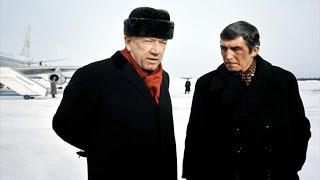 Spy films don't come much drearier than The Kremlin Letter (1970). John Huston's convoluted thriller struggles to engage viewers despite international locations and a dynamite cast.
Spy films don't come much drearier than The Kremlin Letter (1970). John Huston's convoluted thriller struggles to engage viewers despite international locations and a dynamite cast. A letter proposing a US-Soviet alliance against China falls into KGB hands after an agent's suicide. Naval officer Rone (Patrick O'Neal), garrulous spymaster Ward (Richard Boone) and assorted others travel to Moscow to retrieve it. Rone begins an affair with Erika (Bibi Andersson), wife of KGB Colonel Kosnov (Max Von Sydow) as Ward and friends sift for information. They find themselves pawns in a power struggle between Kosnov and Bresnavich (Orson Welles), a Kremlin official cleaning house.
Based on Noel Behn's novel, The Kremlin Letter provides the apotheosis of the "realistic" spy flick. Here, this means sleaziness and graphic violence. The Whore (Nigel Green) pimps mud-wrestling hookers; Warlock (George Sanders) is a drag queen; B.A. (Barbara Parkins) grimly beds Rone as on-the-job training. Ward threatens to turn a Soviet official's daughter into a lesbian if he doesn't cooperate. Along with brutal murders and nasty twists, it relishes despair for its own sake.
Huston directs without style, using handsome Finnish scenery to bolster the show. Huston and Gladys Hill's script generates some interest showing the spies operate (the Whore recruiting prostitutes, Warlock seducing an art dealer) but the agents remain types, the plot machinations inscrutable. Only Erika receives any depth, a despairing housewife escaping into drugs and prostitution. Naturally, she suffers the nastiest fate imaginable.
Of course, John Le Carre and Frederick Forsyth can sell intricate, grounded spy dramas. But The Kremlin Letter lacks an entry point. It hinges on a tedious turf feud: we barely know why Kosnov and Bresnavich hate each other, or why it matters. Amidst this muddle, the titular letter becomes an afterthought. Instead there's a series of killings and betrayals, depicted in the most sluggish, staccato manner imaginable. Kremlin's so lifeless it makes Topaz seem like Goldfinger.
Patrick O'Neal offers all the charisma of particle board, requiring his costars to carry the show. Richard Boone dominates, his boorish chumminess concealing an ice-cold killer. Nigel Green, Dean Jagger and George Sanders easily sell their underwritten ancillary roles. European stars Bibi Andersson, Lila Kedrova and Max Von Sydow contribute grace notes. Orson Welles is typically phoned-in, with Barbara Parkins providing prudish eye candy. Huston cameos as an Admiral.
Movies like The Kremlin Letter confuse nihilism with realism, bleeding away humanity, style and tension. Without them it's a cold, sterile exercise in plot mechanics, less gripping than your average Man from UNCLE episode.

